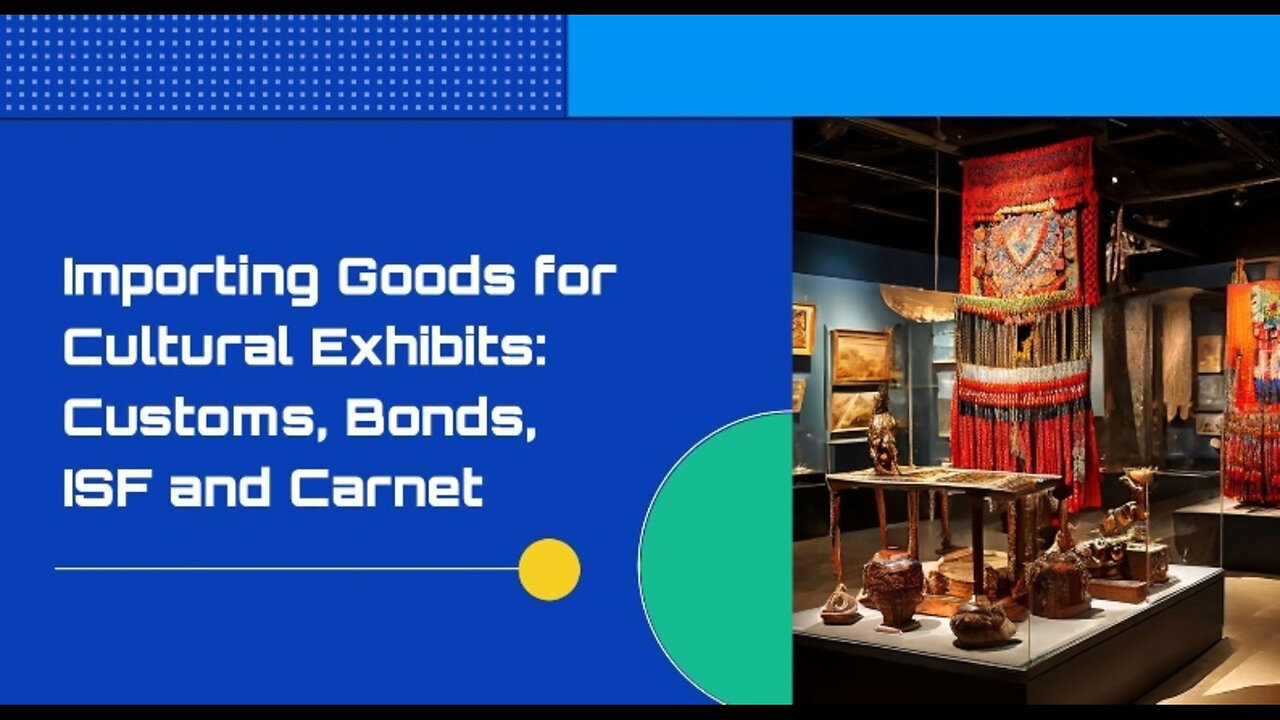Premium Only Content

Unlocking the Secrets of Importing Goods for Cultural and Artistic Exhibitions!
ISF Template | 562-453-7357 | isf@isftemplate.com | www.isftemplate.com
In today's video, we discussed the process of importing goods for cultural or artistic exhibitions. We emphasized the importance of understanding customs brokerage in this context, as customs brokers play a vital role in ensuring compliance with import and export regulations.
One of the key considerations when importing goods for these exhibitions is obtaining a customs bond. This financial guarantee serves as a form of security for customs and ensures the payment of duties, taxes, and other obligations. It is typically obtained through a surety company or an insurance provider.
Importers should also be aware of the Importer Security Filing (ISF) requirements. ISF is a mandatory filing that must be submitted to customs authorities at least 24 hours before goods are loaded onto a vessel destined for the United States. This filing enhances security and risk assessment of imported goods.
Documentation and record-keeping are crucial when importing goods for cultural or artistic exhibitions. Importers should maintain comprehensive files of all relevant documents, such as commercial invoices, bills of lading or airway bills, and packing lists. These documents demonstrate the value, origin, and nature of the goods, ensuring compliance with customs regulations.
Temporary importation is an important option to consider when importing goods for exhibitions. This allows goods to enter a country for a specific period without incurring permanent import duties or taxes. To facilitate temporary importation, a Carnet may be required. A Carnet is an internationally recognized customs document that simplifies customs procedures for temporary imports and re-exports.
In conclusion, importing goods for cultural or artistic exhibitions involves careful planning and adherence to customs regulations. Working with a customs broker who specializes in these exhibitions can greatly facilitate the process and ensure compliance. Obtaining a customs bond, submitting the ISF, maintaining comprehensive documentation, and considering temporary importation options using a Carnet are all essential steps in this process. We hope you found this video informative, and if you have any questions or suggestions, please let us know in the comments below. Thank you for watching and don't forget to subscribe to our channel for more content.
#usimportbond
#isfcustomsbroker
#uscustomsclearing
#isfentry
Video Disclaimer Here: This video is designed for education and is unaffiliated with US government bodies.
00:40 - Customs Brokerage: Customs brokers play a crucial role in ensuring compliance with import and export regulations for cultural and artistic exhibitions.
1:07 - Customs Bond: Obtaining a customs bond is mandatory when importing goods for exhibitions, serving as a financial guarantee for payment of duties and taxes.
1:38 - Importer Security Filing (ISF): ISF is a mandatory filing submitted to Customs and Border Protection before goods are loaded onto a vessel, enhancing security and risk assessment.
2:09 - Documentation and Record-Keeping: Maintaining comprehensive documentation including commercial invoices, bills of lading, and packing lists is essential for demonstrating the value, origin, and nature of imported goods for compliance with customs regulations.
-
 1:00:33
1:00:33
inspirePlay
12 hours ago🏌️♂️ 3 Joes vs 1 Pro Golfer – You Won’t Believe This Ending! 🤯🔥
1.24K -
 20:47
20:47
MTNTOUGH Fitness Lab
19 hours agoDELAYED: Kyrgyzstan Ibex Hunt | A MTNTOUGH Original
2.29K -
 59:50
59:50
Trumpet Daily
19 hours ago $3.18 earnedThe End of the Trans-Atlantic Alliance - Trumpet Daily LIVE | Feb. 17, 2025
5.27K18 -
 52:05
52:05
PMG
10 hours agoWhat Does Freedom Cost? Steven Solomon's On-the-Ground Documentary in Ukraine
2K -
 2:38:54
2:38:54
TimcastIRL
11 hours agoElon Secret Child Scandal ERUPTS, Ashley St. Clair Story Goes Viral w/Bethany Mandel | Timcast IRL
167K107 -
 2:04:52
2:04:52
Kim Iversen
13 hours agoElon's Pumping Out Babies Like They're Tesla Model 3's | EU Panics Over Peace Talks, Wants More War
161K152 -
 1:05:35
1:05:35
Man in America
15 hours agoFort Knox & Trump’s Secret Gold Move—The Financial Reset NO ONE Is Ready For?
106K126 -
 2:21:20
2:21:20
Robert Gouveia
12 hours agoTrump Goes to SCOTUS! Judge CAVES on DOGE? Fani Willis Not Happy!
120K32 -
 20:41
20:41
Stephen Gardner
12 hours ago🔥You Won't BELIEVE What JUST Happened To Don Trump Jr.!!
128K209 -
 58:00
58:00
The StoneZONE with Roger Stone
10 hours agoEuropean Leaders Resist Trump Peace Overtures To Their Own Demise | The StoneZONE w/ Roger Stone
87.3K12